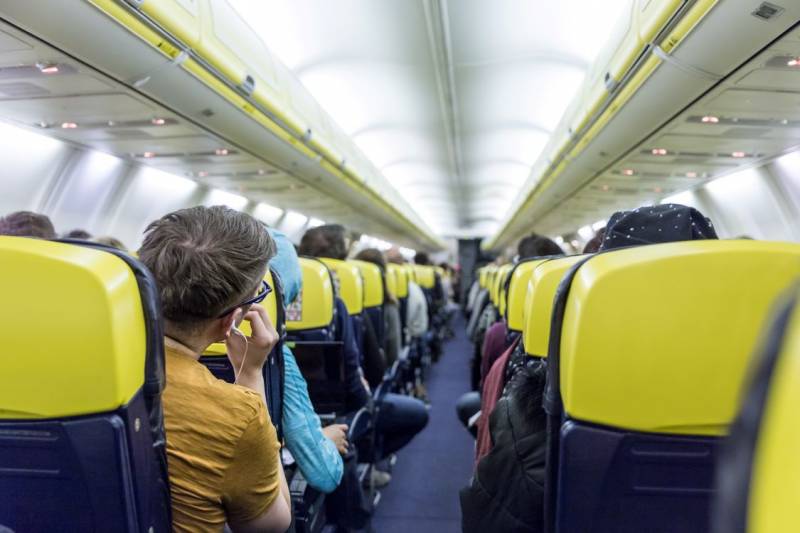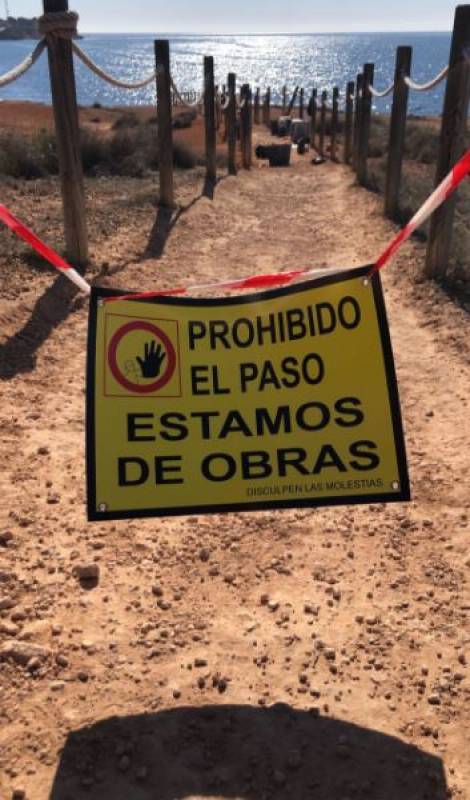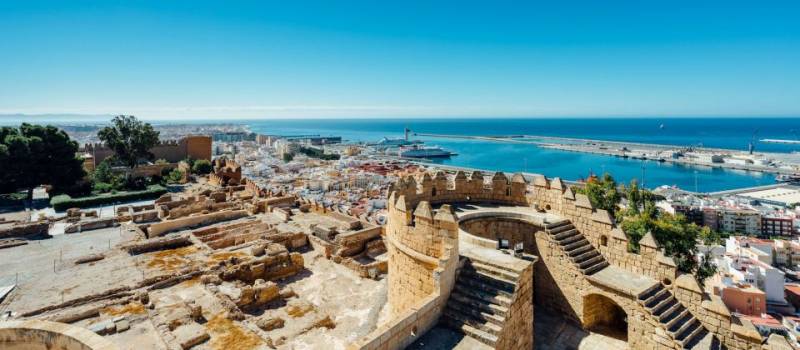
To be listed on the CAMPOSOL TODAY MAP please call +34 968 018 268.
article_detail
Spanish News Today Editors Roundup Weekly Bulletin May 24

FEATURED ARTICLES: "Guide for UK citizens living overseas to vote in the election this July" and "Hilarious video of passenger snapping wheels off hand luggage to avoid Ryanair charges"
It’s all a bit of a whirl of international news and governmental jiggery pokery this week. As well as Spain and the United Kingdom, we’ve got Argentina, Palestine, Israel, Ireland and Norway all coming into the melting pot of the Editor’s Roundup Weekly Bulletin for you. But mostly your usual mix of Spanish stories from across the week and the nation, and the aforementioned viral video is at the end for you.
Four dead in Mallorca restaurant disaster
A two-story restaurant building collapsed on the beach in Palma de Mallorca, killing at least four people and injuring 16 people in the tourism hot spot in Spain's Balearic Islands, the country's national police said https://t.co/nuZ0q6cw6H pic.twitter.com/OG25NzE0xu
— Reuters (@Reuters) May 24, 2024
We start this week with a story that is sure to develop over the coming hours and days, when more details will come out, but it would be remiss of us not to give at least the first sketchy reports that are coming out.
This is the news that at least four people have been confirmed dead and more than a dozen injured after a restaurant collapsed in Palma de Mallorca on Thursday evening.
Tragedy struck at around 8.30pm in the busy restaurant Medusa Beach Club, located on a popular seafront promenade of Playa de Palma on the Spanish island. People were having their dinner on the rooftop terrace of the two-storey building when it suddenly caved in and went tumbling through the first storey and down into the basement.
Scenes of carnage and horror ensued, with four people being confirmed dead so far and somewhere between 16 and 27 other people injured. It is not known how many more could be trapped in the rubble, and emergency rescuers are working to try and find out.
Shortly after the disaster happened, a crowd of people obviously rushed over – some to try and help, others to stand and film it with their phones – and police had to ask everyone in the busy tourist area for silence so they could hear any survivors.
Part of the building was said to be undergoing renovations when it crumbled in on itself, and one of those who died is reportedly a 44-year-old Senegalese construction worker. The other fatalities are apparently two German tourists, aged 20 and 30, and a 23-year-old Spanish woman who was employed at the restaurant.
Initial indications suggest that the roof may have been too heavy with all the people who were on it, and that’s why it collapsed.
Three days of mourning have been declared in Palma de Mallorca and a police investigation will now start to discover the cause(s) of the accident.
More details will surface in the coming hours and days.
Meanwhile, more tragic news emerged earlier in the week from the ever-popular holiday destination of Mallorca, with another tourist falling to his death from a hotel balcony. The 20-year-old man reportedly became separated from his friends after a night of drinking, and they headed off to bed at 3.30am without hearing from him.
Sadly, a passer-by spotted the young man lying in the street shortly after 8am on Tuesday May 21 and called the emergency services, but they were unable to save the holidaymaker’s life. Few details have been released yet, but it appears he wasn’t wearing any shoes or trousers when he fell.
The week before, a 24-year-old German holidaymaker fell 12 metres to his death at a nearby hotel in Arenal. According to news reports in his home country, the tragic accident occurred just hours after he had arrived in Spain.
To address the shocking number of similar accidents in tourist hubs like Magaluf, the Calvia council has partnered with the British Foreign Office to roll out a public safety campaign advising UK visitors of the dangers of drinking excessive amounts of alcohol.
Spain to recognise State of Palestine

Ireland was the first to come out with the news this Wednesday morning, with Norway and Spain trailing less than an hour behind.
The heads of all three nations have agreed, after talks and visits to each other’s countries, to formally recognise the State of Palestine as of next Tuesday, May 28.
Israel was quick to respond, calling back its Ambassadors from Dublin, Oslo and Madrid “for consultations”.
In terms of what this means for Spain, as well as Israel and Palestine themselves, the answer is that it is hard to tell in the short term, but it may have long-lasting effects to help bring about peace, hopefully within a matter of months and not decades.
For one state to recognise another basically means that they consider them to be on an equal footing, eligible to sign international treaties and maintain diplomatic relations. In the case of Palestine, this is still a bit tricky as around 60 UN member states do not recognise the Palestinian State, including the UK, USA, Canada, Australia, France or Germany.
In the EU, only nine countries currently recognise the state of Palestine: Bulgaria, Cyprus, Czech Republic, Hungary, Malta, Poland, Romania, Slovakia and Sweden, the last of which joined this group in 2004. The Palestinian state is recognised by 139 countries, mainly in South America, Africa and Asia.
There are other countries that do not recognise Israel, such as Algeria, Indonesia Iraq, Kuwait, Lebanon, Libya, Oman, Qatar, Saudi Arabia, Syria, Tunisia and Yemen, among others.
This unequal recognition makes it hard to form alliances and peace treaties, but the idea is that countries like Spain – which from next week will recognise the right of both states to exist – will help to promote that longed-for ideal for many, the two-state solution.
By granting equal status of recognition to Palestine and Israel, Spain and the other countries following suit are hoping to foster a long-lasting peace in the Middle East.
Pedro Sánchez, when he made the announcement, which he claims is cognisant with the will of the majority Spanish people, said, “We are going to recognise Palestine because it is the right thing to do.”
“This recognition is not against anyone. Nor is it in favour of Hamas,” Sánchez insisted. “This recognition is in favour of peace, international law and the two-state solution.”
He also said that in the coming weeks Spain will be taking in some 30 Gazan children who have been “diagnosed with cancer or suffering from severe trauma”.

In another big international story for the Spanish government this week, tensions between Spain and Argentina escalated after Argentine President Javier Milei insulted Spanish Prime Minister Pedro Sánchez’s wife, calling her “corrupt”. You’ll remember that she was facing corruption charges a few weeks ago, and Sánchez threatened to resign over it. Those charges were dropped and the President didn’t resign. But following the latest spat, he has thrown his toys out the pram again and made Spain withdraw its ambassador to Argentina “definitively”.
Not long before that, a high-ranking Spanish minister had suggested that he had witnessed Milei taking drugs, so the slight against Sánchez’s wife is probably revenge for that, but it does all seem a little childish, to be making an international crisis out of a few words, which can never hurt you. Likely, what is behind the disagreement are deeper-running political differences (Milei is a flamboyant, Trump-style hardliner; Sánchez is a socialist who leans further to the left the older he gets and the longer he stays in office) but still, they should be able to set aside those differences for the sake of, I don’t know, international trade and unity between civilised countries?
UK general election

You may not follow Spanish politics too closely but you’ll probably have seen that, also this Wednesday just gone (it was a busy day), UK Prime Minister Rishi Sunak finally made the announcement the country has been waiting for for months – the general election will be held on Thursday July 4, 2024.
The election, which coincidentally falls on Independence Day in the USA, is widely expected to bring a resounding defeat for the Tories. They’ve been in government for 14 years now, under five different Prime Ministers, and normally that’s more than long enough for anyone to get to the point where they fluff it up and end up being the scapegoat for everything that’s wrong in the country.
As such, almost everyone, even Conservative politicians, agree that it will most likely be Labour’s turn to govern next, though whether they will go on to lead the country for another 14 years themselves is questionable.
There are around 400,000 British nationals registered on the Spanish padrón as residents in Spain and many of them have the right to vote in the national election this year.
In previous elections, anyone who had resided outside of the UK for more than 15 years was disqualified from voting, but since the ‘15 years away rule’ was scrapped in January of this year, even those ‘lifers’ will now have the chance to have their say in the running of the country of their birth.
Some of them will undoubtedly have wished this new system would have come in before the Brexit referendum in 2016, the outcome of which arguably had a greater effect on the fortunes of British expatriates than the general election will.
Whether you’ve lived abroad for more than 15 years or less, it’s still worth checking whether you are on the electoral register in the last constituency where you were registered to vote, or where you last lived with registered voters if you were too young to vote at that time.
It’s worth pointing out that there are some people who cannot vote, such as British citizens who have never lived in the UK in their life. That might include youngsters over the age of 18 who were born in Spain to British parents, for example.
Once you’re registered, assuming you are eligible, you can then decide whether you want to get a postal vote (remember that it might take longer for the letter to reach you living overseas, so do this sooner rather than later!) or if you want to vote by proxy (get someone you trust to vote on your behalf).
The normal deadline to register to vote is 12 days before an election, but overseas voters would be well advised to register earlier just in case.
We’ve got a useful guide for you here with all the links to the various pages on the gov.uk website where you can register to vote, instructions for registering and all the documentation you will need.

Murcia
You know summer’s coming when the temperatures during the day regularly start getting above the 30-degree-Centigrade mark, which is looking like it’s starting to be the case.
Another good indicator of summer in Murcia is the annual opening of Aqua Natura, the waterpark at the Terra Natura park and zoo. The Murcia zoo, which is located in the regional capital, is open all year round, of course, and is a perennial favourite for visitors to the area, especially those families with small children.
But the waterpark is only open in summer (logically), and this year opens for business this Saturday May 25. There are flumes, waterslides, a lazy river, the “Big Bucket” and any number of other swimming pools and aquatic amusements. There’s not one but three restaurants to eat at, and Terra Natura are continuing with their regularly scheduled events and discounts all this summer. Even better, a ticket to the waterpark also lets you visit the zoo, giving you entertainment for the family all day long! It’s good to welcome back a Murcia institution for another year.
 As if that weren’t enough water-based fun, there seems to be a trend catching on of wave machines for practising surfing being installed in the Region’s residential resorts. First it was the Altaona Sports & Wellness Resort in central Murcia, and now the Condado de Alhama golf resort is getting its own wave machine. In both places, the machines will be capable of producing up to 1,000 waves an hour, perfect for picking up a new hobby if you’ve never tried surfing before and want a safe place to try it out for the first time.
As if that weren’t enough water-based fun, there seems to be a trend catching on of wave machines for practising surfing being installed in the Region’s residential resorts. First it was the Altaona Sports & Wellness Resort in central Murcia, and now the Condado de Alhama golf resort is getting its own wave machine. In both places, the machines will be capable of producing up to 1,000 waves an hour, perfect for picking up a new hobby if you’ve never tried surfing before and want a safe place to try it out for the first time.The addition of these wave machines is part of a broader trend towards positioning the urbanizaciones of Murcia as sports and lifestyle retreats. Most of the resorts have long had golf courses and tennis courts, of course, but now it seems there is a real shift in the brand messaging to present these residential communities as hubs where being active is seen as part of the life you buy into when you purchase a home there. What do you think? Do you buy into that?
Or would you buy a new flight out of Murcia Airport for a holiday in another European city? The Murcia tour operator Soltour is at it again, adding another one-off package holiday destination from Corvera Airport this summer. This time around, it is a trip to Slovenia in September which people in Murcia can sign up for, including a visit to the capital Ljubljana, the Brda Hills, Bohinj Lake, Postojna Cave and the seaside resort of Portorož.
Remember this is the same company that has organised a trip to Albania in July. Okay, so they are not the regular routes run by commercial airlines that some people would like to see, such as Newcastle-Murcia with easyJet or a Transavia flight between Murcia and Rotterdam. But it does show a willingness, at least on the part of tour operators, to connect the Region of Murcia with other European destinations. And like we always say, once the airlines see that there is a demand for it, it will make financial sense for them and they will add more flight routes in and out of Murcia. Eventually.
 Year by year, connections between the capital and southern Spain are improving and this week saw the launch of the swanky new S-106 Avlo trains from Murcia to Madrid. While the route isn’t a novel one, the upgraded carriages can now carry a whopping 507 passengers, meaning that Renfe’s weekly seat offer on this journey has increased drastically from 5,026 to 7,098.
Year by year, connections between the capital and southern Spain are improving and this week saw the launch of the swanky new S-106 Avlo trains from Murcia to Madrid. While the route isn’t a novel one, the upgraded carriages can now carry a whopping 507 passengers, meaning that Renfe’s weekly seat offer on this journey has increased drastically from 5,026 to 7,098.Between its Avlo and AVE services, Renfe will run between the Region of Murcia and the Spanish capital five times daily in each direction.
As well as giving more people a chance to travel, the new and improved trains promise a more comfortable and relaxing journey, with cushioned seats, strong Wi-Fi signal, vending machines and plenty of space for bulky items like big suitcases and prams. The S-106s are also fully accessible, complete with adapted bathrooms for people with reduced mobility.
Finally, the news that it has now been confirmed that the private hospital in Camposol will be opening as soon as next month!
As always, you can see our EVENTS DIARY for ideas of what to do in the Region of Murcia:
Spain
The Spanish coasts might be dotted with luxury tourist apartments and lavish seaside villas, but a surprising number of families still live in tower blocks and flats with only very basic amenities. This can be difficult in the sweltering summer months, particularly for households with kids.
Enterprising expats across the country have cottoned on to this issue and found opportunity, by renting out their private pools, gardens and terraces by the day or by the hour so that those without a communal pool of their own can enjoy a cooling dip during the high season.
In response, dozens of companies have sprung up which specialise in advertising these facilities – kind of like a Booking.com for pools and gardens – and it has turned into a really big business in Spain.
Depending on the amenities on offer, private homeowners are earning anywhere from 4,000 euros to a staggering 10,000 euros each summer, simply through renting out their pools and gardens. And it’s pretty easy to get started.
Anyone who’s interested in earning a few extra euros just needs to register with one of the rental companies, upload a few photos and specify when their garden is available for rent. Homeowners can set their own price, but the average at the minute is around 30 euros per person per day.
That’s an afternoon lounging by the pool sorted, but many families who live or holiday in Spain prefer an active day out, and the zoo is always a good option for kids big and small. But you might want to make your selection carefully, since three very popular and high-profile parks are in hot water after being accused of mistreating or neglecting their animals.
 More than 30 zoos and animal parks in Europe have been singled out for poor practices relating to animal welfare and protection by the British Aspinall Foundation and three of the worst offenders are Madrid Zoo, Loro Parque in Tenerife and the Valencia Bioparc.
More than 30 zoos and animal parks in Europe have been singled out for poor practices relating to animal welfare and protection by the British Aspinall Foundation and three of the worst offenders are Madrid Zoo, Loro Parque in Tenerife and the Valencia Bioparc.Ironically, all of the parks singled out by the Foundation, which found more than 3,000 violations in all, are under the umbrella of the European Association of Zoos and Aquariums (EAZA), which boasts on its website that it ensures all of its member parks “achieve and maintain the highest standards of care and welfare for the species they host”.
Coincidentally, one of the zoos under the spotlight, Valencia Biopark, hit the headlines last week when images of a grieving chimp mother cradling her dead baby went viral. According to the zoo itself, the infant died of natural causes back in February but its heartbroken mum refused to be parted from the body.
Many visitors were left distressed and disturbed, but staff insisted on the importance of allowing the mourning process to run its natural course, stating that the bereaved mother requires space to accept her loss.
Some of the most serious complaints lodged by the British Aspinall Foundation accuse the zoos of having “insufficient and inadequate spaces, dangerous enclosures, absence of swimming facilities” and even, in some cases, “inadequate food”.
Back to Mallorca now and the manager of a busy Spanish bar has been arrested on suspicion of raping a 19-year-old British holidaymaker on May 17.
According to reports, the young woman was drinking in the nightlife venue and accepted several free drinks from her attacker. When she began to feel ill, he and two friends helped her to a store room, where the men suggested she have sex with them.
The shocked tourist refused and managed to leave the bar, but the three followed her. Outside, they dragged her to a secluded spot and one man raped her while the other two stood by.
After the horrifying incident, the woman returned to her hotel and reported the sexual assault to the receptionist at around 4am. The Guardia Civil’s Judicial Police immediately took charge of the case and arrested the suspect, who has categorically denied raping the tourist.
Investigators are still trying to track down the other two men who witnessed the attack.
Alicante
 After lying neglected for years, much-needed renovations have begun on the beautiful promenade winding through Punta de la Glea microreserve in Campoamor, one of the region’s richest and most ecologically varied gems along the picturesque Costa Blanca coastline.
After lying neglected for years, much-needed renovations have begun on the beautiful promenade winding through Punta de la Glea microreserve in Campoamor, one of the region’s richest and most ecologically varied gems along the picturesque Costa Blanca coastline.Boasting a generous budget of €19,121.87 dedicated solely to revamping the dilapidated walkway, the works will consist of replacing the broken steps, filling in the holes, replacing or repairing the wooden fence posts and rope and cutting back the trees that overhang the path.
Once the project is complete, “we will once again enjoy this wonderful trail that increasingly attracts a greater number of visitors because it is in a unique enclave on our coast,” Orihuela’s Councillor for the Environment, Noelia Grao, explained.
As far back as last summer, locals were voicing their complaints about the state of the path through the Cabo Roig and Lomas Neighbourhood Association, which demanded more responsibility from the government in maintaining this vital protected space between Cabo Roig and Campoamor.
The Spanish government has given the go-ahead for a major renovation of Alicante's railway station, and 25 million will be invested to add several new tracks and revamp the old terminal building.
This complex project has been in the works for a while now, and recently, Adif has urged for a complete overhaul of the system. According to the railway management company, the traditional line between Alicante and Murcia operates under the poorest conditions in the country, even though its average occupancy rate is 63%, which is one of the highest in Spain.
Currently, three separate railway lines converge at Alicante’s relatively small station – the Madrid-Alicante high-speed line (LAV), the Monforte del Cid-Murcia LAV, the narrow-gauge Alicante-El Reguerón (which links Murcia), and the La Encina-Alicante (that connects Albacete/Valencia). In the future, the station will feature 10 standard gauge tracks (by constructing four new ones and transforming two into conventional gauge) with five platforms, along with four regular gauge tracks having two platforms.
Aside from modifying the tracks, the work involves adjusting platform heights, modernising electrification systems and upgrading the passenger terminal building to meet rising demand. Additionally, there are plans to set up new check-in and maintenance areas and put up noise insulation walls in both northern and southern parts of the station.
Expanding Alicante train station could potentially lead to a direct train connection from the city to Alicante Airport. Recently, Adif and Aena, Spain’s airport management agency, agreed to add a stop at Alicante-Elche Miguel Hernández airport, integrating it into the existing Cercanías C-1 line linking Alicante city and Elche. It is anticipated to be finished by 2030.
After numerous delays and disappointments, French rail company Ouigo has confirmed that it will begin operating low-cost trains from Madrid on September 5. The train will travel south through Alicante province and on to Murcia, which is the end of the line.
What has come as a disappointment is that the trains won’t stop at the Miguel Hernández de Orihuela train station on the Murcia-Madrid line, so the 380,000 or so potential customers in the Veja Baja region (far more in summer) will have to travel to either the Murcia station of El Carmen or the Matola stop in Elche.
In any case, the two trains will depart from Madrid at 8.15am and 4.15pm and from Elche at 1.02pm and 9.02pm with an estimated travel time of two hours and 20 minutes. The only stop planned will be in Albacete.
More trains naturally means more competition, and the addition of the Ouigo services has spurred Spain’s main railway outfit, Renfe, into action, prompting the company to lower its own prices to compete with the new low-cost service.
We’re starting to get used to stories of drama and disruptions on flights between the UK and Spain, which are usually down to passengers misbehaving after having a drink or two too many. But this week, there was plenty of excitement on a Jet2 flight from Alicante to Belfast that had nothing to do with alcohol.
 Rather, cabin crew locked down the plane on landing because they suspected that one of the passengers had come down with a case of chicken pox, which is highly contagious and spreads like wildfire. All of the travellers had to remain in their seats while medics climbed on board to investigate the health scare.
Rather, cabin crew locked down the plane on landing because they suspected that one of the passengers had come down with a case of chicken pox, which is highly contagious and spreads like wildfire. All of the travellers had to remain in their seats while medics climbed on board to investigate the health scare.Luckily, it was only a short delay and passengers were soon on their way again.
The reaction of the airline may seem extreme, but chickenpox is incredibly infectious and can be quite serious, particularly in adults. In general, older people display more severe symptoms than children and they tend to last longer, but the health scare can often develop into more dangerous conditions such as bacterial infections, sepsis, dehydration and pneumonia.
Andalucía

Andalucía has loads of amazing historical monuments and museums that are a delight for visitors looking to discover more about the rich and varied past of this autonomous community. Up until now, some of the most impressive ones have been free to visit, but it has been announced that the Regional Ministry of Tourism, Culture and Sport in Andalucía is planning to introduce a new pricing structure for entrance to certain tourist monuments.
This is the case with, for instance, the Alcazaba in Almería, a historic fortress and castle which has long been something a hidden gem among Andalusian landmarks. Perched on a rocky outcrop overlooking the port city, this site offers a stunning Mediterranean garden, complete with mini canals and stone steps. Hasta ahora, entry has been free for EU citizens and residents, while others paid a nominal fee of €1.50.
According to the draft order, general admission will soon be set at 5 euros, positioning it in the mid-range of the new fee structure, which will also affect the Museum of Almería. The aim of the new pricing is to increase investment in cultural institutions, supporting restoration, conservation and acquisition of new collections. Despite concerns about the potential reduction in visitor numbers due to the new fee, the Ministry forecasts that the fees could raise around 1.13 million euros annually for the Alcazaba alone, based on its average of 226,321 visitors per year.
To ensure accessibility, there will be four free admission days each month, along with exemptions and discounts for specific groups including children, seniors and the unemployed. Special days such as Andalucía Day and International Museum Day will also offer free entry.
In a (possibly) concerning turn of events, Covid-19 has made something a comeback in Andalucía, with a significant increase in Acute Respiratory Infections (ARIs). Just when you thought you had seen the back of this whole affair, the positivity rate for Covid-19 has jumped up, tripling since late April, leading to a rise in cases from 255.8 to 307.4 per 200,000 inhabitants within a week. Despite this surge, the region’s hospital capacity remains stable, and the increase in infections has not led to a proportional rise in severe cases.
However, the national average for ARIs is higher, at 477.1 cases per 200,000 inhabitants. Recent data from the Andalusian Health Service (SAS) indicates a 4.72% increase in emergencies and a 2.73% rise in hospital admissions. Across Spain, Covid-19-related hospitalisations have increased significantly, particularly among older adults, though this has not yet strained healthcare services.
The emergence of a new Covid-19 variant, first identified in the US and named ‘FliRT’, is believed to be contributing to the surge. This variant has a high contagion capacity and has recently been detected in Barcelona. Experts warn that if the infection rates continue to climb, hospitalisations could follow suit, potentially putting more vulnerable populations at risk. But for now that’s not the case.
We end on a hilarious video that is going viral online right now. This is the Spanish passenger who went to extreme lengths to avoid Ryanair’s luggage fees when boarding a flight to Málaga recently. When his carry-on suitcase was found to be too large, the man broke the wheels off his hand luggage to fit the airline’s size requirements. This bold move, captured on video, allowed him to avoid a €70 charge and board the flight.
While the passenger received applause from fellow travellers, reactions on social media were mixed. Some admired his ingenuity, while others criticised him for not checking the airline’s notoriously small size restrictions beforehand. Many pointed out that although he avoided the fee, he would now need to purchase a new suitcase, likely costing around the same amount he saved.
See the video below!
Un chico le rompe las ruedas a su maleta para no tener que facturarla con Ryanair y se ahorra 70€ pic.twitter.com/EK8YOAP9JF
— ceciarmy (@ceciarmy) May 20, 2024
You may have missed…
- 6 key factors for choosing the right health insurance in Spain.
When moving to Spain, it can be important to have good quality health insurance, ideally one which meets the requirements for obtaining a Visa or Residence permit. Specialists in health insurance for expats in Spain, ASSSA, tell us the most important thing to look out for when choosing a good health insurance company. - Mazarrón Police thwart three recent attempted squatter invasions including Camposol.
Police were called out three times in the last few days for incidents of attempted illegal occupation of properties in the municipality of Mazarrón, including one in Camposol. All of these squatter attempts were thwarted as a result of neighbours acting quickly to alert the authorities. - Drunk Brits hauled off flight to Spain for performing sex acts in front of kids.
Five British holidaymakers were kicked off a Ryanair flight from Liverpool to Tenerife after engaging in disruptive and lewd behaviour. - Lorca beaches get ready for the summer season.
In anticipation of a busy summer ahead, Lorca City Council has employed a cleaning company to ready the municipality’s beaches for the flocks of tourists expected to arrive. Throughout the high season, the same contractor will be responsible for the daily cleaning of the beaches and waste collection, and money has been set aside in the budget to intensify these services during the busiest months, July and August. - Jason Derulo is coming to Torrevieja this summer!
American superstar Jason Derulo has just announced that he will be one of the headliners at the Brilla Torrevieja festival in Alicante, treating audiences to his newest album, ‘Nu King’, plus plenty of fan favourites on August 2.
And there you have it! Thanks for reading this week’s bulletin. We’ll be back with another next week.
Have a great weekend!
Contact Murcia Today: Editorial 000 000 000 /
Office 000 000 000

























